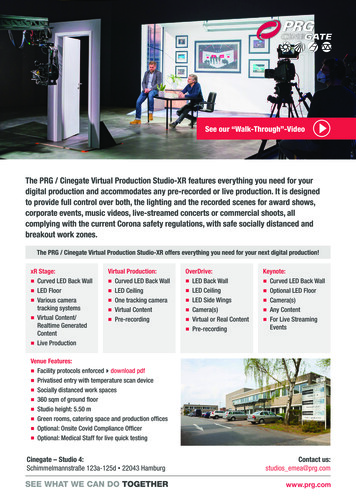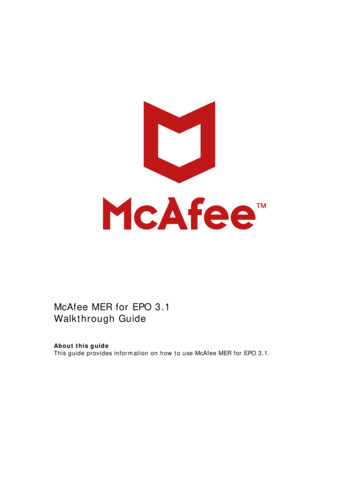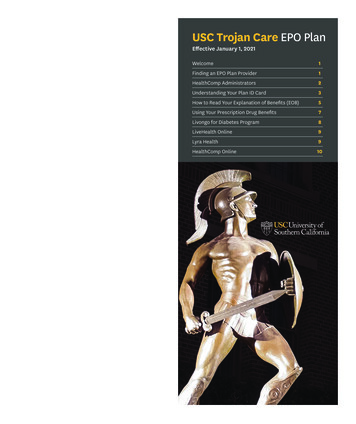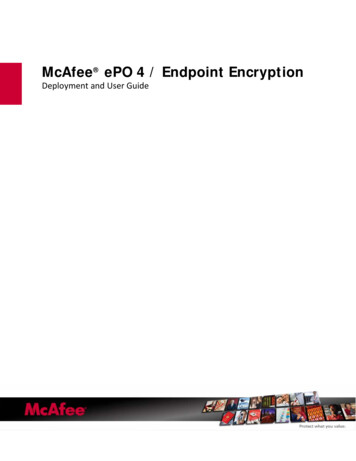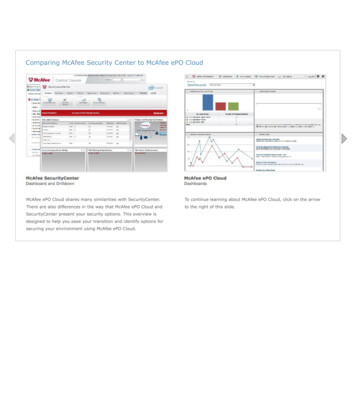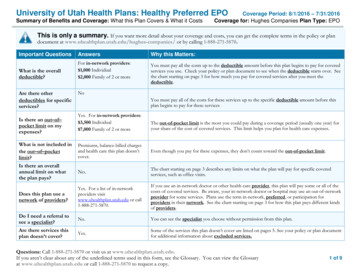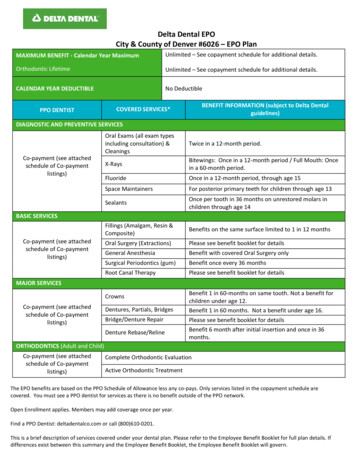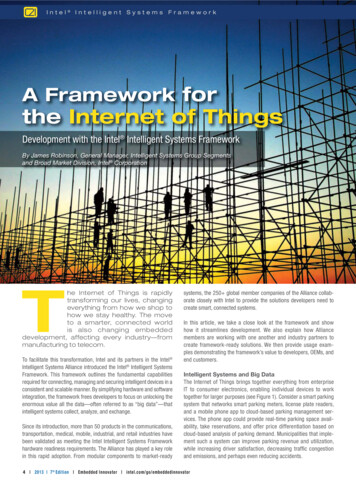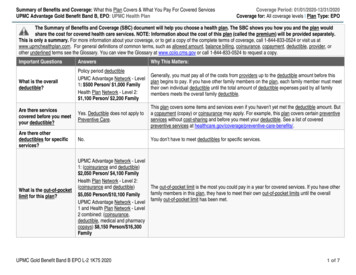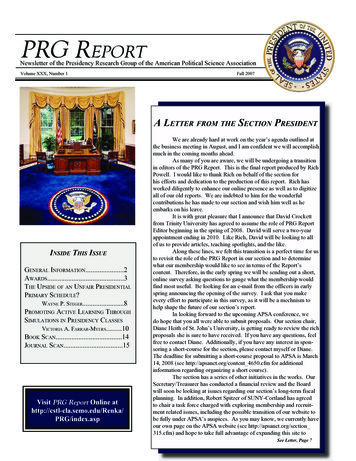
Transcription
PRG REPORTNewsletter of the Presidency Research Group of the American Political Science AssociationVolume XXX, Number 1Fall 2007A LETTER FROM THE SECTION PRESIDENTINSIDE THIS ISSUEGENERAL INFORMATION.2AWARDS.3THE UPSIDE OF AN UNFAIR PRESIDENTIALPRIMARY SCHEDULE?WAYNE P. STEGER.8PROMOTING ACTIVE LEARNING THROUGHSIMULATIONS IN PRESIDENCY CLASSESVICTORIA A. FARRAR-MYERS.10BOOK SCAN.14JOURNAL SCAN.15Visit PRG Report Online athttp://cstl-cla.semo.edu/Renka/PRG/index.aspWe are already hard at work on the year’s agenda outlined atthe business meeting in August, and I am confident we will accomplishmuch in the coming months ahead.As many of you are aware, we will be undergoing a transitionin editors of the PRG Report. This is the final report produced by RichPowell. I would like to thank Rich on behalf of the section forhis efforts and dedication to the production of this report. Rich hasworked diligently to enhance our online presence as well as to digitizeall of our old reports. We are indebted to him for the wonderfulcontributions he has made to our section and wish him well as heembarks on his leave.It is with great pleasure that I announce that David Crockettfrom Trinity University has agreed to assume the role of PRG ReportEditor beginning in the spring of 2008. David will serve a two-yearappointment ending in 2010. Like Rich, David will be looking to allof us to provide articles, teaching spotlights, and the like.Along these lines, we felt this transition is a perfect time for usto revisit the role of the PRG Report in our section and to determinewhat our membership would like to see in terms of the Report’scontent. Therefore, in the early spring we will be sending out a short,online survey asking questions to gauge what the membership wouldfind most useful. Be looking for an e-mail from the officers in earlyspring announcing the opening of the survey. I ask that you makeevery effort to participate in this survey, as it will be a mechnism tohelp shape the future of our section’s report.In looking forward to the upcoming APSA conference, wedo hope that you all were able to submit proposals. Our section chair,Diane Heith of St. John’s University, is getting ready to review the richproposals she is sure to have received. If you have any questions, feelfree to contact Diane. Additionally, if you have any interest in sponsoring a short-course for the section, please contact myself or Diane.The deadline for submitting a short-course proposal to APSA is March14, 2008 (see http://apsanet.org/content 4650.cfm for additionalinformation regarding organizing a short course).The section has a series of other initiatives in the works. OurSecretary/Treasurer has conducted a financial review and the Boardwill soon be looking at issues regarding our section’s long-term fiscalplanning. In addition, Robert Spitzer of SUNY-Cortland has agreedto chair a task force charged with exploring membership and recruitment related issues, including the possible transition of our website tobe fully under APSA’s auspices. As you may know, we currently haveour own page on the APSA website (see http://apsanet.org/section315.cfm) and hope to take full advantage of expanding this site toSee Letter, Page 7
PRG REPORTPRG OFFICERSPresidentVictoria A. Farrar-MyersUniversity of Texas, ArlingtonDepartment of Political SciencePO Box 19539601 South NeddermanArlington, TX 76019-0539victoria@uta.eduThe PRG REPORT is published twice annually on behalf of the PresidencyResearch Section of the American Political Science Association.The PRG REPORT serves the scholarly community in presidential and executivepolitics. The editor of the Report welcomes your submissions and ideas.Editor:Richard J. PowellDepartment of Political ScienceUniversity of Maine229 North Stevens HallOrono, ME 04469Phone: (207) 581-1795Fax: (207) 581-4856rpowell@maine.eduVice President & President ElectCharles E. WalcottVirginia Polytechnic InstituteDepartment of Political Science528 Major Williams Hall - 0130Blacksburg, VA 24061cwalcott@vt.eduSecretary/TreasurerJeffrey E. CohenFordham UniversityDepartment of Political Science441 East Fordham RoadBronx, NY 10458cohen@fordham.eduPRG Report EditorRichard J. PowellUniversity of MaineDepartment of Political Science229 North Stevens HallOrono, ME 04469rpowell@maine.edu2008 Program ChairDiane J. HeithSt. John’s UniversityDepartment of Government & Politics8000 Utopia ParkwayJamaica, NY 11439heithd@stjohns.eduPast PresidentLori Cox HanChapman UniversityDepartment of Political ScienceOne University DriveOrange, CA 92866lhan@chapman.eduEditorial Assistant:Meghan S. SimondsDepartment of Political ScienceUniversity of MaineBOARD OF DIRECTORS:Randall Adkins (2005-2008), University of Nebraska, OmahaNancy Baker (2006-2009), New Mexico State UniversityTerri Bimes (2006-2009), Harvard UniversityDavid B. Cohen (2005-2008), University of AkronDavid Crockett (2006-2009), Trinity UniversityBrendan Doherty (graduate student, 2005-2008), U.S. Naval AcademyChris Dolan (2005-2008), University of Central FloridaMatthew Eshbaugh-Soha (2006-2009), University of North TexasLilly Goren (2007-2010), Carroll CollegeKaren Hoffman (2005-2008), Wheeling Jesuit UniversityChristopher S. Kelley (2006-2007), Miami UniversityMartha Joynt Kumar (Ex Officio), Towson UniversityKen Mayer (2007-2010), University of WisconsinKevin McMahon (2007-2010), Trinity CollegeJeff Peake (2007-2010), Bowling Green State UniversityAndrew Rudalevige (2006-2009), Dickinson CollegeSteven Schier (2005-2008), Carleton CollegeShirley Anne Warshaw (2007-2010), Gettysburg CollegeStephen Weatherford (2005-2008), University of California, Santa BarbaraSYMPOSIUM ANNOUNCEMENTThe Ralph and Mary Regula Center for Public Service at Mount UnionCollege in Northeast Ohio is organizing a symposium on the legacy ofGeorge W. Bush on March 1, 2008. MUC Assistant Professor MikeGrossman, one of the organizers of the event, has asked this informationbe shared with PRG members. The website where you can access further information is as follows: [http://www.muc.edu/bush symposium]Fall 20072
AWARDSPRG SECTION AWARDSRICHARD E. NEUSTADT AWARDThe Richard E. Neustadt Award is given for the best bookpublished that contributed to research and scholarship in the fieldof the American presidency during the previous year.2007 Richard E. Neustadt Award Recipient:Brandice Canes-Wrone, Princeton UniversityTitle: Who Leads Whom? Presidents, Policy, and thePublic (University of Chicago Press, 2006)Nominations for the 2008 Neustadt Award can be sent to theaward committee. Please note the full contact information isprovided for each committee member since books must be sent toall members.George C. Edwards, III, ChairTexas A&M University, College StationDepartment of Political Science2010 Bush Academic West4348 TAMUCollege Station, TX 77843-4348gedwards@tamu.eduCommittee Members:Paul BraceRice UniversityDepartment of Political Science208 Baker Hall6100 Main StreetHouston, TX 77005pbrace@rice.eduColin CampbellUniversity of British ColumbiaDepartment of Political ScienceC425-1866Main MallVancouver, B.C. V6T 1Z1colincampbell@politics.ubc.caKaren HoffmanWheeling Jesuit UniversityDepartment of Political Science316 Washington AvenueWheeling, WV 26003khoffman@wju.eduMel LaraceyUniversity of Texas at San AntonioDepartment of Political Science501 West Durango Boulevard, BV 4.380San Antonio, TX 78207Melvin.Laracey@utsa.eduNominations should be submitted by February 1, 2008.Fall 20073
FOUNDERS AWARDThe Founders Award, named in honor of Martha Joynt Kumar,is given for the best paper presented by a graduate student ateither the preceding year’s APSA annual meeting or at any of theregional meetings in 2006-2007.2006-2007 Founders Award Recipient:Kevin James Parsneau, University of MinnesotaTitle: “Politicizing Priority Departments:Presidential Policy Priorities and SubcabinetNominations”Nominations for the 2007-2008 Founders Award, named in honorof David Neveh, can be sent to the award committee.Andrew J. Dowdle, ChairUniversity of ArkansasDepartment of Political ScienceOld Main, Room 428Fayetteville, AR 72701adowdle@uark.eduCommittee Members:Graham Dodds, Concordia UniversityTobias Gibson, Monmouth CollegeKaren Hult, Virginia Tech UniversityLeah Murray, Weber State CollegeNominations should be submitted by May 1, 2008.FOUNDERS AWARD (PHD.)The Founders Award (PhD.), named in honor of ErwinHargrove, is given for the best paper presented by a PhD-holdingscholar at the previous year’s APSA annual meeting.2007 Founders Paper Award Co-Recipients:Jeffrey Cohen, Fordham University and Matthew EshbaughSoha, University of North TexasTitle: “Change and Stability in the President’sLegislative Policy Agenda, 1789-2002”Nominations for the 2008 Founders Paper Award, named inhonor of Bert Rockman, can be sent to the award committee.Stephen Weatherford, ChairUniversity of California, Santa BarbaraDepartment of Political ScienceSanta Barbara, CA 93106-9420weatherford@polsci.ucsb.eduCommittee Members:Randall Adkins, University of Nebraska, OmahaDavid Lewis, Princeton UniversityBruce Miroff, University of Albany, SUNYDavid Yalof, University of ConnecticutNominations should be submitted by February 1, 2008.Fall 20074
BEST UNDERGRADUATEPAPER AWARDThe Best Undergraduate Paper Award is given for the bestundergraduate paper completed in the present academic year.2006-2007 Best Undergraduate Paper Award Recipient:Carrie Roush, Dickinson CollegeTitle: “‘Great Writ,’ Great Power: Habeus Corpusand Prerogative in the Lincoln and Bush IIPresidencies”Nominations for the 2007-2008 Best Undergraduate Paper Awardcan be sent to the award committee.Thomas S. Langston, ChairTulane UniversityPolitical ScienceNorman Mayer Building #66823 St. Charles AvenueNew Orleans, LA 70118-5698langston@tulane.eduCommittee Members:Alfred Cuzan, University of West FloridaLilly Goren, Carroll CollegeNancy Kassop, SUNY-New PaltzBrian Newman, Pepperdine UniversityNominations should be submitted by May 1, 2008.PAUL PECK PRESIDENTIAL AWARDThe Paul Peck Presidential Award is presented by the NationalPortrait Gallery of the Smithsonian Institution to honorpresidential service and portrayal. The PRG represents APSA asone of the eight nominating organizations. For more information,please visit http://www.npg.si.edu/.John T. Woolley, ChairUniversity of California, Santa BarbaraDepartment of Political ScienceMail Code 9420Santa Barbara, CA 93106-9420woolley@polsci.ucsb.eduCommittee Members:John Burke, University of VermontCaroline Heldman, Occidental CollegeDaniel Ponder, Drury UniversityShirley Warshaw, Gettysburg CollegeThe deadline will be set by the Smithsonian Institution.Fall 20075
GEORGE C. EDWARDS IIIDISSERTATION AWARD**NEW AWARD**The George C. Edwards III Dissertation Award will be givenannually for the best dissertation in presidency researchcompleted and accepted during the 2007 calendar year (January1, 2007 - December 31, 2007). The recipient will receive a 200 award. To be considered for the award, nominees mustsubmit the following documents to each member of the awardcommittee: (1) a hard copy of the dissertation, (2) a PDF of thedissertation on a CD, (3) a nominee form, (4) a nominator formand letter. The award committee welcomes nominations bydissertation committee chairs or committee members.MaryAnne Borrelli, ChairConnecticut CollegeDepartment of GovernmentCollege Box 5418270 Mohegan AvenueNew London, CT 06320mabor@conncoll.eduCommittee Members:Terri BimesUniversity of California, BerkeleyDepartment of Political Science210 Barrows Hall, #1950Berkeley, CA 94707-1950bimes@berkeley.eduRebecca DeenUniversity of Texas, ArlingtonDepartment of Political ScienceP.O. Box 19539601 South NeddermanArlington, TX 76019-0539deen@uta.eduJeffrey PeakeBowling Green State UniversityDepartment of Political ScienceBowling Green, OH 43403jpeake@bgnet.bgsu.eduWayne StegerDePaul UniversityDepartment of Political Science990 W. Fullerton Building, Suite 2200Chicago, IL 60614wsteger@depaul.eduNominations should be submitted by February 1, 2008.Fall 20076
The Career Service Award is given every year during a presidential election year, the PRG shall form a committee to give anaward to recognize career service to the study of the Presidency.CAREER SERVICE AWARDBruce F. Nesmith, ChairCoe CollegeDepartment of Political Science1220 1st Avenue, NECedar Rapids, IA 52402-5092bnesmith@coe.eduCommittee Members:David Adler, Idaho State UniversityRyan Barilleaux, Miami UniversityMeena Bose, Hofstra UniversityElvin Lim, University of TulsaNominations should be submitted by February 1, 2008.Letter, continued from Page 1include the information currently and diligently maintained forus by Russ Renka of Southeast Missouri State University (seehttp://cstl-cla.semo.edu/Renka/PRG/).Work continues on planning for a spring 2009 PRGsponsored conference on presidential decision-making, and several section members have agreed to advise in the process. Rightnow we are working on trying to secure funding for the conference. If you have any ideas for potential sources of funding,please do not hesitate to contact me. Look for more informationregarding this in the coming months.Please remember to nominate our members for the various section awards. For information regarding the various committees, please reference the Award Section of this PRG Report.We would especially remind those of you who have publishedbooks in the last year to have your publishers send the books toour Richard E. Neustadt Award chair (George Edwards at TexasA&M University). Additionally, please do not forget our newestaward, the George C. Edwards III Dissertation Award (see theAPSA website for details regarding submissions or contact thecommittee chair, MaryAnne Borrelli of Connecticut College).In addition, we will be presenting the section’s Career ServiceAward this year, as we do every four years to coincide with presidential election years.This brings me to a reminder regarding our ongoingfundraising initiatives. Under the leadership of Martha Kumarand with a 1,000 donation by the PRG, we are over our 5,000goal for endowing the Edwards Dissertation Award. As you mayrecall, though, we are not only attempting to endow the Dissertation Award, but also the Neustadt Award. Look for an e-mail inthe coming weeks regarding this initiative and how you mightparticipate. These endowments will be a nice legacy to continuethe long tradition of mentorship and recognition of excellenceby the PRG of its members. Please consider participating in thisworthy endeavor.Thank you to those of you who have shared informationwith us via our listserv. Please continue to share your news ofjob openings, conferences, and other special issues of interest tosection members. Certainly, do not hesitate to contact me if anyquestions arise or if you have things that you wish posted to thefull membership.On a final note, I wish to thank the many of you whohave offered your support to the section and who have not hesitated to volunteer in various capacities when I have called uponyou. I am particularly honored to serve amongst such a wonderful group of scholars and look forward to working with you toadvance the PRG in the year ahead.All my best –Victoria Farrar-MyersPRG President 2007-2008Fall 20077
THE UPSIDE OF AN UNFAIR PRESIDENTIAL PRIMARY SCHEDULE?Wayne P. StegerThere is considerable concern that our presidentialnominating system is broken and needs to be fixed (e.g., Haskell1996; Mayer and Busch 2004). The current front-loading ofthe primary calendar is certainly problematic, but proposals fora regional or national primary may make the system worse incertain respects. Proposals for a regional primary, such as the billintroduced in Congress by Joseph Lieberman, are geared towardchanging the existing system in which Iowa and New Hampshirehave a dominant role, while staving off more dramatic movementtoward a de facto national primary. For better or worse, we aremarried to an imperfect nomination system because other potential primary sequences are less desirable than the current one.First, the concerns with Iowa and New Hampshire areoften overblown in the news media. The main effects of theIowa and New Hampshire caucuses are on the candidates andthe media—both spend inordinate amounts of time and money inthese states. These nominating elections also affect the choicesavailable to voters in subsequent primaries, but the main effect isto persuade poorly performing candidates to drop out of the race(e.g., Steger 20002; Norrander 2006). The withdrawal of thesecandidates from the race does not affect outcomes as much asis commonly thought. Dark horse candidates pin their hopes onthese states to break through and reverse their status as also-rans;most do not. The vast majority of candidates who do poorlyin the Iowa caucus and New Hampshire primary are failing toresonate with large numbers of voters and campaign contributors.The Iowa caucuses arguably was not the cause of Howard Dean’scollapse in 2004. Howard Dean’s campaign had peaked in thethird week of December of 2003 when he gained his largest leadin national Gallup polls and gained the endorsement of Al Goreand other elected officials. Dean actually declined in polls relative to other candidates thereafter. Dean’s chances were fallingas he became subjected to greater scrutiny. That Iowans did notsupport him probably owes more to the information that thesevoters possessed relative to the national audience, than it did tothese voters having dramatically different values. While the NewHampshire primary has a more powerful effect on the nominationin Democratic races, the resulting bias in favor of a New Englandliberal candidate reflects the preferences of the geographic andideological base of the Democratic Party. The New England biasprobably does constrain the chances of moderate candidates-which may be why Lieberman and others are proposing regionalprimaries that would amplify the impact of ideologically moderate preferences in the nomination campaign.Even though Iowa and New Hampshire do affect theoptions of voters in subsequent primaries, beginning a sequenceof primaries with two small states with a history of going firstis advantageous for several reasons. First, small states requirecandidates to engage in retail or personalized campaigning ratherthan wholesale campaigning through mass media. Candidatesin the current system must interact with people which means thatcandidates learn more about real people with real concerns ratherthan relying on pollsters and paid advisors. Second, the voters in Iowa and New Hampshire are bombarded with campaigninformation, so their awareness of the candidates greatly exceedsthat of voters in a national or regional primary. The choices madeby Iowans and New Hampshirites are probably better informed.That these states have had a history of going first is importantbecause these voters have learned to take that responsibility seriously, which would not necessarily occur with a random, rotatingprimary schedule. Third, candidates with less money are able tocompete, which reduces the impact of money and well-heeledcontributors—mainly better educated, wealthier activists withsufficiently intense issue preferences to open their pocketbooks.Moving toward a national primary or a system of rotating regional primaries would create problems of its own. First,there can be little question that it would advantage candidateswho can raise large sums of money since only strong fundraisers could compete simultaneously in multiple states. Second, theconstituencies advantaged by a money-driven campaign are thericher and better educated activists who can contribute and whohave intense enough preferences to do so. Third, a system thatadvantages political party activists with intense issue preferenceswould likely contribute to a more polarized electorate selectingthe presidential nominees of both parties. This, in turn, wouldcreate greater dissatisfaction with the general election outcomeon the part of the losing partisans. Fourth, there is less candidatelearning in a national or regional primary system since candidatesnecessarily have to rely more on mass media to communicatewith hundreds of thousands if not millions more voters in a shorttime frame. Fifth, citizens will likely be less informed aboutcandidates since voters in regional or national primary wouldFall 20078
be less exposed to campaign messages compared to the averagevoter in the early states in the existing system. Finally, there is anincreased chance of having no winner decided in the primariesunder a national or regional system if no candidate dominateseverywhere which could happen if several candidates with moneytarget their campaigns--competing in areas where they can dominate while avoiding those areas where they have less appeal. Inshort, the beneficiaries of a regional or national primary systemare wealthier, better educated activists with relatively extremeviews on issues, the media whose ratings thrive on uncertaintyand drama, and candidates who play well with both of these audiences.ReferencesHaskell, John. “Reforming the Presidential Primaries: ThreeSteps for Improving the Campaign Environment.” PresidentialStudies Quarterly, 26, 1996, pp. 374-379.Mayer, William G. and Andrew E. Busch. The Front-LoadingProblem in Presidential Nominations. Washington, DC: Brookings Institution, 2004.Norrander, Barbara. “The Attrition Game: Initial Resources,Initial Contests and the Exit of Candidates During the US Presidential Primary Season.” British Journal of Political Science, 36,2006, pp. 487-507.Steger, Wayne P., John Hickman, and Ken Yohn. “CandidateCompetition and Attrition in Presidential Primaries, 1912-2000.”American Politics Research, 30, 2002, pp. 528-554.Wayne P. Steger is Associate Professor of Political Science atDePaul University in Chicago, IL.Fall 20079
PROMOTING ACTIVE LEARNING THROUGH SIMULATIONS INPRESIDENCY CLASSESVictoria A. Farrar-Myers(see generally Bonwell & Eison, 1991); The professor: e.g., the professor’s comfort level withstudent interaction and the amount of control in theclassroom the professor desires (see generally Bonwell& Sutherland, 1996); and The students: e.g., prior exposure and experiences(Hoover, 2006), students’ different learning styles(Kolb, 1981; Cross, 1998), and student motivation(Gross Davis, 1993) or indifference (Warren, 1997) toparticipate in active learning activities.“If you tell me, I will listen. If you show me, I will see. But if you let me experience, I will learn.” - Lao-TseLao-Tse’s insight captures the essence of an activelearning based approach to education. Such an approach calls forstudents to have a role and responsibility in developing their ownknowledge; in the words of John Dewey, learning is “somethingthat an individual does when he studies. It is an active, personallyconducted affair” (1924). Unlike more traditional teaching styleswhere the instructor simply transfers information to the student,who is required to do little more than act as a depository for suchinformation (Freire, 1970) or as a sponge soaking it up (Keeley,Ali & Gebing, 1998; Fox-Cardamone & Rue, 2003), an activelearning approach places an emphasis on students’ independentinquiry, restructuring of their knowledge, and other constructivistqualities (Niemi, 2002).Employing active learning strategies in political science classes not only has been shown to work (Brock & Cameron, 1999), but more importantly would seem to be a naturalfit. “Learning is not a spectator sport” (Chickering and Gamson,1987), and neither is the world of politics. As a result, one wayto enhance students’ learning about the political world is for themto “talk about what they are learning, write about it, relate it topast experiences and apply it to their daily lives. They must makewhat they learn part of themselves” (Chickering and Gamson,1987). Further, active learning techniques – particularly if tiedto learning outcomes designed to promote higher order thinking skills such as analysis, application, synthesis, and evaluation(Bloom, 1956) – can help students prepare “to tackle a multitudeof challenges that they are likely to face in their personal lives,careers, and duties as responsible citizens” (Tsui, 2002). Aspolitical scientists, we may be in the best position in the academyto promote a sense of civic engagement in our students, and theuse of intentionally designed active learning techniques tied tospecific learning outcomes can greatly assist us in helping toinstill this sense.The use of active learning encompasses a wide arrayof teaching techniques that can be used in large classes as wellas small ones; techniques such as: using guided lectures andanswering open-ended, student-generated questions (Bonwell& Eison, 1991); using primary sources in the classroom (May,1986); cooperative learning (Smith, 1986); and simulations androle-playing games (Shannon, 1986; for a general discussion onactive learning strategies, see Bonwell & Eison, 1991; Astin etal., 1984; and Schomberg, 1986). However, finding a techniquethat works successfully can be influenced by: Institutional variables: e.g., size of class, physicalarrangement of classrooms, and lack of incentives forprofessors to undertake new active learning strategiesThe POTUS and PASS projects were two semester-long,in-class simulations employing active learning techniques anddesigned to achieve desired course learning outcomes. Despitesome initial reluctance by the students, these simulations helpedthem achieve the course outcomes, but more significantly generated a high level of efficacy, engagement, and understanding.Although the specific model employed may not work in everycontext (the variables noted above will create a different dynamicin each class), the process by which these projects were developed and employed may provide those who teach presidency-related classes with insights on how to best employ active learningtechniques in their own setting.The 2008 presidential election marks the first time since1952 that a sitting president or vice president will not be a candidate for nomination in either major party. As I was developingmy general survey course on the U.S. Presidency in the fall of2005, I contemplated how to make this factoid become more relevant to my students, especially since encouraging civic engagement and voter participation in the 18-24 year-old age group hasbeen a focus in recent presidential races. I wanted a way to bringto life the usual discussion of presidential elections and encourage my students to become active participants in the process ofidentifying, evaluating, and promoting various candidates. Outof these thoughts germinated The POTUS Project – short for ThePresident Of The United States Project.In this simulation, my students took on the role ofpolitical consultants responsible for developing a plan to guidetheir candidate to the Oval Office. Each student started by assessing the viability of a chosen candidate and then developinga strategy for winning that candidate’s party nomination. Atmid-semester, the class divided into two groups – the two majorparties – to hold a nomination convention where each party choseits own presidential-vice presidential ticket. Students had tocaucus and advocate for their own candidate much like the Iowacaucus. From there, each team developed a “Vision Statement”for its candidate to let the voters know their candidate’s strategyfor winning the general election, transitioning into power, andgoverning as president once in office. Each group presented its“Vision Statement” to the full class and to two real-world politi-Fall 200710
cal consultants. The students were not alone in their learningendeavor. I took the liberty of writing to each of our selectedcandidates, telling them about the project and asking them towrite my students. Two of the candidates did and in sharingthese letters with the class, my students and I became acutelyaware that what we were learning has meaning outside the fourwalls of our classroom; the very lesson I hope to impart in eachof my classes.In the end, The POTUS Project allowed the students tocombine the course material with real life events and possibilities, and to work with their classmates to create a comprehensiveelectoral plan for someone who might become the next Presidentof the United States. In doing so, the students were able to reinforce their learning through individual and group-effort writtenanalysis and oral presentation. Further, the Project achieved thedesired outcome of fostering collaborative action after individualanalysis. Since most political enterprises take place withinworking groups or teams, these simulations allowed the studentsto gain experience with, as well as a direct appreciation for, thisimportant political enterprise. Most significantly, through botha formal student evaluation of The POTUS Project and informaldiscussions with individual students, I found that they appliedtheir knowledge in more sophisticated ways than in my more traditional course offering as well as reported more ownership andcomfort with the core concepts of the class. They also reporteda greater sense of efficacy and understanding of the presidentialselection process; even two years later, I received an email froma student indicating how she is using the knowledge and insightsgained from her class experience to be more engaged with thisyear’s actual presidential primaries.With the lessons I learned from The POTUS Project, Idecided to employ a similar model in an upper-division courseentitled Presidency and Foreign Policy. In The PASS Project(Presidential Advisory Strategy Simulation), the students playedthe role of foreign policy analysts a
The deadline for submitting a short-course proposal to APSA is March . published that contributed to research and scholarship in the field of the American presidency during the previous year. . Melvin.Laracey@utsa.edu Nominations should be submitted by February 1, 2008. RICHARD E. NEUSTADT AWARD.
